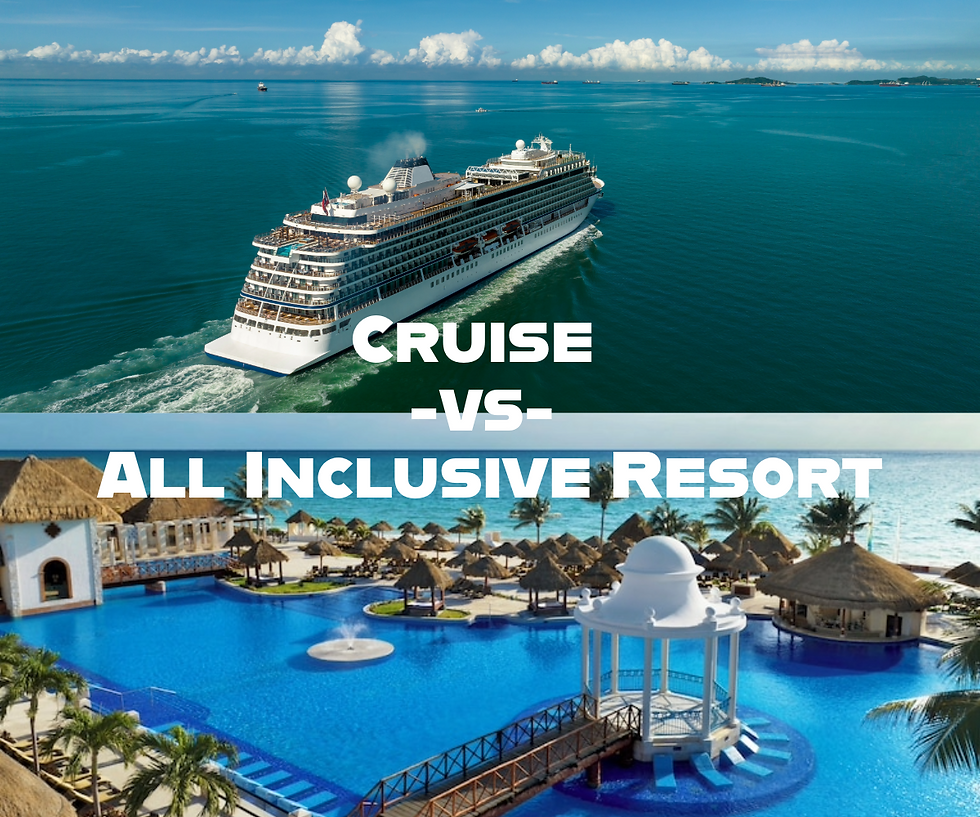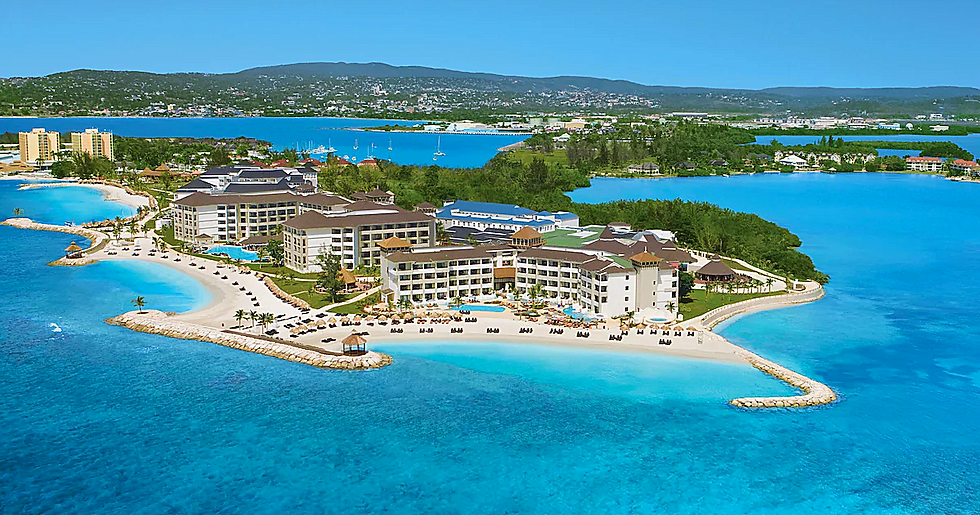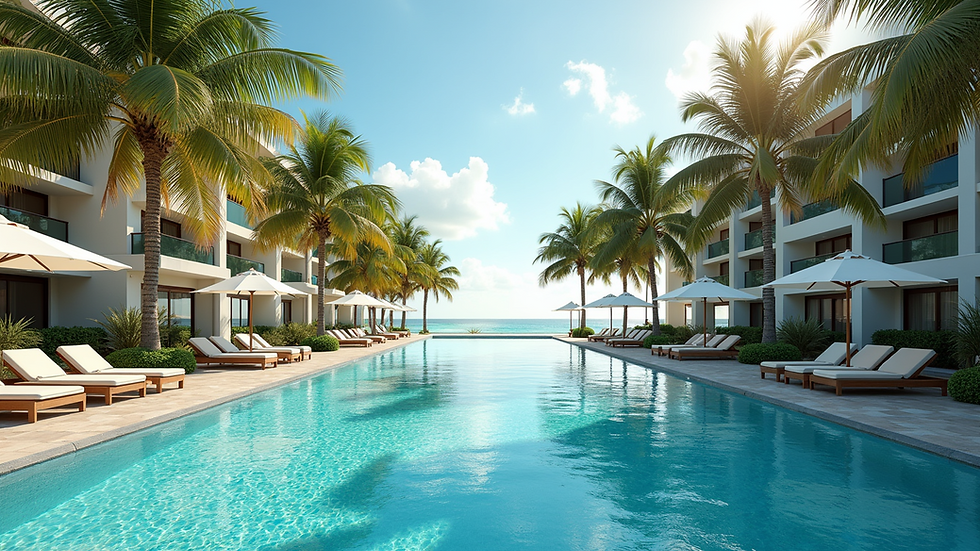Cruises vs All Inclusive Resorts Which Vacation is Right for You
- Jacob Allen

- Nov 9
- 5 min read
When it comes to planning a vacation, two popular options often come to mind: cruises and all-inclusive resorts. Both offer unique experiences, but which one is right for you? In this post, we will explore the pros and cons of each option, look at the costs involved, and provide useful tips on planning your ideal getaway. This can help you determine whether you should be dreaming of the open sea or a tropical beach.

Understanding Cruises
Cruises are like floating resorts, taking you to several destinations while offering a range of activities and entertainment. They are suited for travelers wanting to see multiple places without the hassle of constantly packing and unpacking.
Pros of Cruises
Multiple Destinations: A significant advantage of a cruise is the chance to wake up in a different port almost every day. For example, on a Caribbean cruise, you could visit Cozumel, Grand Cayman, and Jamaica all in one week.
Onboard Entertainment: Cruises provide a wide variety of entertainment, including Broadway-style shows, live music, and activities like cooking classes. Some cruise lines report that around 80% of guests partake in at least one show during their trip.
Dining Variety: Most cruises offer many dining options, from buffet-style meals to gourmet restaurants. For instance, a cruise might feature international cuisine with a new culinary option each night.
All-Inclusive Packages: Many cruise lines have all-inclusive packages, covering meals, accommodations, and entertainment, simplifying budgeting. A common package may include three meals a day, snacks, and evening events.
Social Atmosphere: Cruises allow travelers to meet new people, enhancing the experience. About 60% of guests on cruises report making friends during their trip.
Cons of Cruises
Limited Time in Ports: While you can visit multiple sites, the time in each port is often short. Many cruises allow only 6-8 hours in port, limiting in-depth exploration.
Extra Costs: Although many things are included, there may be additional charges for excursions, specialty dining, and drinks. Some guests find these extras can add over $300 to their onboard spending.
Crowds: Larger ships can host thousands of passengers, creating crowded spaces, especially during peak seasons.
Less Flexibility: Cruises run on tight schedules, which can restrict spontaneous plans. If you miss the boat, there may be limited options for catching up.
Motion Sickness: Some travelers may experience seasickness, which can dampen the enjoyment. Research indicates that about 20% of individuals on cruises suffer from some form of seasickness.

Understanding All-Inclusive Resorts
All-inclusive resorts provide a different vacation vibe, often set in beautiful tropical environments. They offer various amenities and activities, typically included in one upfront price.
Pros of All-Inclusive Resorts
Unlimited Access: Guests can enjoy food, drinks, and activities with no hidden costs. This model means you can enjoy multiple meals and cocktails without worrying about your bill.
Relaxation: Many resorts emphasize relaxation, featuring stunning beaches, pools, and spas. For instance, resorts often offer beachside massages and yoga sessions.
Flexibility: Guests can engage in as many or as few activities as they wish. This may mean lounging by the pool or enjoying a cooking class, depending on your mood.
Family-Friendly Options: Many resorts include kids’ clubs that provide entertainment for children, allowing parents to enjoy some private time.
No Hidden Fees: The all-inclusive model leads to clear and predictable budgeting. With most costs known upfront, guests avoid surprising charges upon departure.
Cons of All-Inclusive Resorts
Limited Exploration: Staying at a resort may limit chances to explore nearby attractions. While many resorts offer excursions, some might not include them in the all-inclusive price.
Potential for Monotony: The resort experience can become repetitive after a few days, especially for those who thrive on adventure.
Quality of Food and Service: While many resorts boast excellent dining, some may fall short of expectations. For example, a mid-range resort's dining options may not compete with those found in higher-end hotels.
Crowded Facilities: Popular resorts can become very busy during peak season, affecting guests' comfort and experience.
Less Social Interaction: Although there are chances to socialize, the atmosphere may not be as lively as on a cruise.
Basic Costs: Cruises vs. All-Inclusive Resorts
Understanding the costs associated with these vacations is crucial for proper planning.
Cruises
Base Fare: The average cost for a cruise can range from $100 to $300 per person per night. For instance, a week-long cruise could cost around $700 if booked well in advance.
Additional Costs: Extras like excursions or specialty dining can add significantly to the bill—expect to pay an extra $200 to $500 for excursions, depending on what you choose to do.
Total Estimated Cost: For a week-long cruise, total costs can vary from $700 to $2,500 per person or higher.
All-Inclusive Resorts
Base Rate: All-inclusive resorts typically charge between $150 and $500 per person per night. A budget traveler might find options at $1,050 for a week, but high-end resorts may charge up to $3,500.
Included Costs: Most meals and drinks are covered, but premium dining or activities like spa treatments may incur extra costs.
Total Estimated Cost: For a week-long stay, the total can range from $1,050 to $3,500, influenced by the chosen resort and season.

Planning Your Vacation: Cruises vs. All-Inclusive Resorts
When planning your vacation, you should consider various factors for both cruises and all-inclusive resorts.
Planning a Cruise
Choose Your Itinerary: Research cruise lines and itineraries to find one that matches your interests—whether it's a Mediterranean cruise or an Alaskan adventure.
Book Early: Early bookings can lead to better deals. Many travelers have saved more than 20% by booking six months in advance.
Consider Upgrades: Cabin upgrades, dining packages, and excursions can enhance your experience; many cruisers report that they appreciated the added luxury.
Check for Promotions: Look for cruise line promotions, such as free upgrades or onboard credits, which can help you save money.
Prepare for Embarkation: Make sure to have all necessary documents, such as passports and any required vaccinations, ready ahead of embarkation day.
Planning an All-Inclusive Resort Stay
Select Your Destination: Research various resorts offering diverse activities and dining options. Consider the best travel times when prices are lowest.
Read Reviews: Check online reviews to understand the quality and services of the resort. Sites like TripAdvisor can be helpful.
Look for Packages: Many resorts have package deals that include flights. This approach can save a significant amount of money.
Plan Activities: While many activities are included, planning a few excursions or adventures can enrich your stay.
Pack Accordingly: Ensure you pack items suitable for the climate and planned activities, from swimwear to dinner attire.
Making the Right Choice for Your Next Getaway
Both cruises and all-inclusive resorts present unique vacation styles, each offering advantages and drawbacks. Cruises are excellent for those who want varied experiences and onboard excitement, while all-inclusive resorts emphasize relaxation and simplicity.
Ultimately, the decision depends on your preferences, budget, and desired experience. By grasping the costs and effectively planning, you can enjoy a memorable getaway, whether sailing across oceans or soaking up the sun on a beach.




Comments